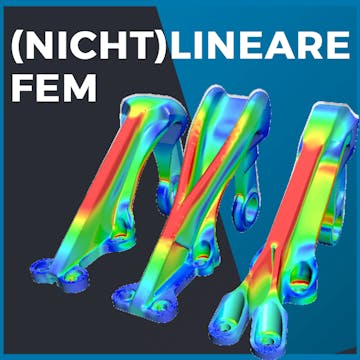
In diesem praktischen Projekt lernen Sie die Finite-Elemente-Methode (FEM) kennen und lernen wie man mit dem cloud-basierten Simulationswerkzeug SimScale eine linear-statische und nichtlineare Simulation aufsetzt. Wir werden einen einfachen Simulationsfall mit einer vorgegebenen Geometrie aufstellen, um die Grundlagen der Finite-Elemente-Methode zu erlernen und wie eine nichtlineare Simulation überhaupt angegangen wird. Wir werden den klassischen dreistufigen Prozess einer jeden Simulation durchlaufen, der die Schritte Pre-Processing, Processing und Post-Processing umfasst.
SimScale ist eine technische Simulationsplattform, die...
Read more
Good to know
Save this course
Activities
Review the basics of FEM and simulation
Show steps
Refresh your understanding of FEM and simulation before starting the course.
Show steps
-
Read introductory articles or books on FEM and simulation.
-
Review your notes or textbooks from previous courses on FEM and simulation.
-
Take practice problems or quizzes to test your understanding.
Go through the SimScale introductory tutorials
Show steps
Gain hands-on experience with SimScale by completing the introductory tutorials, which cover the basics of FEM and simulation.
Show steps
-
Sign up for a free SimScale account.
-
Locate and launch the introductory tutorials.
-
Follow the instructions provided in each tutorial.
Create a simple simulation project in SimScale
Show steps
Apply your understanding of FEM and simulation by creating a simple project in SimScale.
Show steps
-
Define the geometry and material properties of your model.
-
Apply loads and boundary conditions.
-
Run the simulation and analyze the results.
Show all three activities
Review the basics of FEM and simulation
Show steps
Refresh your understanding of FEM and simulation before starting the course.
Show steps
- Read introductory articles or books on FEM and simulation.
- Review your notes or textbooks from previous courses on FEM and simulation.
- Take practice problems or quizzes to test your understanding.
Go through the SimScale introductory tutorials
Show steps
Gain hands-on experience with SimScale by completing the introductory tutorials, which cover the basics of FEM and simulation.
Show steps
- Sign up for a free SimScale account.
- Locate and launch the introductory tutorials.
- Follow the instructions provided in each tutorial.
Create a simple simulation project in SimScale
Show steps
Apply your understanding of FEM and simulation by creating a simple project in SimScale.
Show steps
- Define the geometry and material properties of your model.
- Apply loads and boundary conditions.
- Run the simulation and analyze the results.
Career center
Software Engineer
Mechanical Engineer
Chemical Engineer
Petroleum Engineer
Biomedical Engineer
Civil Engineer
Nuclear Engineer
Aerospace Engineer
Electrical Engineer
Industrial Engineer
Systems Engineer
Computer Engineer
Materials Engineer
Mining Engineer
Automotive Engineer
Reading list
Share
Similar courses
OpenCourser helps millions of learners each year. People visit us to learn workspace skills, ace their exams, and nurture their curiosity.
Our extensive catalog contains over 50,000 courses and twice as many books. Browse by search, by topic, or even by career interests. We'll match you to the right resources quickly.
Find this site helpful? Tell a friend about us.
We're supported by our community of learners. When you purchase or subscribe to courses and programs or purchase books, we may earn a commission from our partners.
Your purchases help us maintain our catalog and keep our servers humming without ads.
Thank you for supporting OpenCourser.



